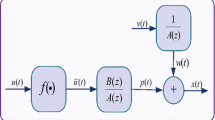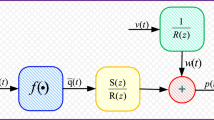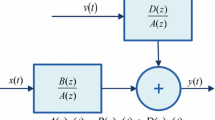Abstract
In this study, a fuzzy-evolution computing paradigm is presented for parameter estimation of fractional Hammerstein control autoregressive (F-HCAR) systems by exploiting the knacks of global optimization strength of genetic algorithms (GAs). The definition of Grunwald–Letnikov fractional derivative is exploiting in standard HCAR system for the development of F-HCAR model. The system identification problem of F-HCAR model is constructed by defining a merit or fitness function using mean square error approximation between the actual and calculated parameters of F-HCAR models. The decision variables of F-HCAR models are determined by optimization of merit function with the knacks of global search with GAs for sundry scenarios on noiseless and noisy environment in the system dynamics. Comparison of results between estimated and predicted responses of F-HCAR systems endorsed the accurate, stable and robust performance fuzzy-evolutionary GAs. The statistical calculations for merit function on MSE, Nash–Sutcliffe efficiency and Theil inequality coefficient through cumulative distribution plots, boxplot illustrations, histograms and probability results of Weibull distribution further substantiated designed procedures of fuzzy evolutionary GAs for F-HCAR systems.




















Similar content being viewed by others
Explore related subjects
Discover the latest articles and news from researchers in related subjects, suggested using machine learning.Data availability
There is no any data associated with the said manuscript.
References
Catania, G., Sorrentino, S.: Analytical modelling and ex-perimental identification of viscoelastic mechanical systems. Springer 6, 403–416 (2013)
Paola, M.D., Pinnola, F.P., Zingales, M.: Fractional diferential equations and related exact mechanical models. Comput. Math. Appl. 66, 608–620 (2013)
Mohammadzadeh, A., Castillo, O., Band, S.S., Mosavi, A.: A novel fractional-order multiple-model type-3 fuzzy control for nonlinear systems with unmodeled dynamics. Int. J. Fuzzy Syst. 1–19 (2021).
Ha, S., Chen, L., Liu, H.: Adaptive Fuzzy variable structure control of fractional-order nonlinear systems with input nonlinearities. Int. J. Fuzzy Syst. 1–15 (2021).
Cheng, Y., Li, Y., Yang, J.: Novel approach of obtaining dynamic multi-attribute weight for intuitionistic fuzzy environment based on fractional integrals. Int. J. Fuzzy Syst. 22(1), 242–256 (2020)
Mathiyalagan, K., Sangeetha, G.: Second-order sliding mode control for nonlinear fractional-order systems. Appl. Math. Comput. 383, 125264 (2020)
Abdelaty, A.M., Roshdy, M., Said, L.A., Radwan, A.G.: Numerical simulations and FPGA implementations of fractional-order systems based on product integration rules. IEEE Access 8, 102093–102105 (2020)
Wang, R., YunNing, Z., Chen, Y., Chen, X., Lei, X.: Fuzzy neural network-based chaos synchronization for a class of fractional-order chaotic systems: an adaptive sliding mode control approach. Nonlinear Dyn. 100(2), 1275–1287 (2020)
Tuan, H.T., Trinh, H.: A qualitative theory of time delay nonlinear fractional-order systems. SIAM J. Control. Optim. 58(3), 1491–1518 (2020)
Song, S., Park, J.H., Zhang, B., Song, X.: Adaptive hybrid fuzzy output feedback control for fractional-order nonlinear systems with time-varying delays and input saturation. Appl. Math. Computat. 364, 124662 (2020)
Yousri, D., Mirjalili, S.: Fractional-order cuckoo search algorithm for parameter identification of the fractional-order chaotic, chaotic with noise and hyper-chaotic financial systems. Eng. Appl. Artif. Intell. 92, 103662 (2020)
Wang, J., Wei, Y., Liu, T., Li, A., Wang, Y.: Fully parametric identification for continuous time fractional order Hammerstein systems. J. Franklin Inst. 357(1), 651–666 (2020)
Zhang, S., Liu, L., Chen, Y.Q., Xue, D.: Synthesised fractional-order PD controller design for fractional-order time-delay systems based on improved robust stability surface analysis. IET Control Theory Appl. 14(20), 3723–3730 (2020)
Shahri, E.S.A., Alfi, A., Machado, J.T.: Lyapunov method for the stability analysis of uncertain fractional-order systems under input saturation. Appl. Math. Model. 81, 663–672 (2020)
Martínez-Guerra, R., Meléndez-Vázquez, F., Trejo-Zúñiga, I.: Fault-tolerant Control and Diagnosis for Integer and Fractional-order Systems-Fundamentals of Fractional Calculus and Differential Algebra with Real-Time Applications, vol. 328, pp. 1–186. Springer, Berlin.
Bingi, K., Ibrahim, R., Karsiti, M.N., Hassan, S.M., Harindran, V.R.: Fractional-Order Systems and PID Controllers. Springer, New York (2020).
Martínez-Guerra, R., Meléndez-Vázquez, F., Trejo-Zúñiga, I.: Fault-tolerant Control and Diagnosis for Integer and Fractional-order Systems.
Chakraverty, S., Jena, R.M., Jena, S.K.: Time-fractional order biological systems with uncertain parameters. Synth. Lect. Math. Stat. 12(1), 1–160 (2020)
Chaudhary, N.I., Raja, M.A.Z.: Design of fractional adaptive strategy for input nonlinear Box-Jenkins systems. Signal Process. 116, 141–151 (2015)
Pu, Y.F., Zhou, J.L., Zhang, Y., Zhang, N., Huang, G., Siarry, P.: Fractional extreme value adaptive training method: fractional steepest descent approach. IEEE Trans. Neural Netw. Learn. Syst. 26(4), 653–662 (2013)
Zubair, S., Chaudhary, N.I., Khan, Z.A., Wang, W.: Momentum fractional LMS for power signal parameter estimation. Signal Process. 142, 441–449 (2018)
Geravanchizadeh, M., Ghalami Osgouei, S.: Speech enhancement by modified convex combination of fractional adaptive filtering. Iran. J. Electric. Electron. Eng. 10(4), 256–266 (2014)
Chaudhary, N.I., Raja, M.A.Z., Khan, A.U.R.: Design of modified fractional adaptive strategies for Hammerstein nonlinear control autoregressive systems. Nonlinear Dyn. 82(4), 1811–1830 (2015)
Chaudhary, N.I., Zubair, S., Raja, M.A.Z., Dedovic, N.: Normalized fractional adaptive methods for nonlinear control autoregressive systems. Appl. Math. Model. 66, 457–471 (2019)
Aslam, M.S., Raja, M.A.Z.: A new adaptive strategy to improve online secondary path modeling in active noise control systems using fractional signal processing approach. Signal Process. 107, 433–443 (2015)
Gogineni, V.C., Talebi, S.P., Werner, S., Mandic, D.P.: Fractional-order correntropy adaptive filters for distributed processing of $\alpha $-stable signals. IEEE Signal Process. Lett. 27, 1884–1888 (2020)
Shezaf, N., Abramov-Segal, H., Sutskover, I., Bar-Sella, R.: Adaptive low complexity algorithm for image zooming at fractional scaling ratio. In: 21st IEEE Convention of the Electrical and Electronic Engineers in Israel. Proceedings (Cat. No. 00EX377) (pp. 253–256). IEEE (2000).
Shah, S.M.: Applications of Fractional Derivatives in Adaptive Signal Processing Systems, PhD dissertation, CUST, Islamabad, Pakistan (2019).
Aslam, M.S., Chaudhary, N.I., Raja, M.A.Z.: A sliding-window approximation-based fractional adaptive strategy for Hammerstein nonlinear ARMAX systems. Nonlinear Dyn. 87(1), 519–533 (2017)
Raja, M.A.Z., Akhtar, R., Chaudhary, N.I., Zhiyu, Z., Khan, Q., Rehman, A.U., Zaman, F.: A new computing paradigm for the optimization of parameters in adaptive beamforming using fractional processing. Eur. Phys. J. Plus 134(6), 275 (2019)
Ye, H.S., Zhou, N.R., Gong, L.H.: Multi-image compression-encryption scheme based on quaternion discrete fractional Hartley transform and improved pixel adaptive diffusion. Signal Process. 175, 107652 (2020).
Hammar, K., Djamah, T., Bettayeb, M.: Identification of fractional Hammerstein system with application to a heating process. Nonlinear Dyn. 96(4), 2613–2626 (2019)
Mohamed, A.O.U.N., Malti, R., Olivier, C.O.I.S., Oustaloup, A.: System identification using fractional Hammerstein models. IFAC Proc. Vol. 35(1), 265–269 (2002)
Hammar, K., Djamah, T., Bettayeb, M.: Nonlinear system identification using fractional Hammerstein-Wiener models. Nonlinear Dyn. 98(3), 2327–2338 (2019)
Liao, Z., Zhu, Z., Liang, S., Peng, C., Wang, Y.: Subspace identification for fractional order Hammerstein systems based on instrumental variables. Int. J. Control Autom. Syst. 10(5), 947–953 (2012)
Hammar, K., Djamah, T., Bettayeb, M.: Fractional hammerstein system identification using particle swarm optimization. In: 2015 7th International Conference on Modelling, Identification and Control (ICMIC), pp. 1–6. IEEE (2015).
Cheng, S., Wei, Y., Sheng, D., Wang, Y.: Identification for Hammerstein nonlinear systems based on universal spline fractional order LMS algorithm. Commun. Nonlinear Sci. Numer. Simul. 79, 104901 (2019).
Rahmani, M.R., Farrokhi, M.: Nonlinear dynamic system identification using neuro-fractional-order Hammerstein model. Trans. Inst. Meas. Control. 40(13), 3872–3883 (2018)
Rahmani, M.R., Farrokhi, M.: Fractional-order hammerstein state-space modeling of nonlinear dynamic systems from input–output measurements. ISA Trans. 96, 177–184 (2020)
Hidalgo, D., Cervantes, L., Castillo, O., Melin, P., Martínez Soto, R.: Fuzzy parameter adaptation in genetic algorithms for the optimization of fuzzy integrators in modular neural networks for multimodal biometry. Computación y Sistemas 24(3), 1093–1105 (2020)
Sabir, Z., Raja, M.A.Z., Guirao, J.L., Saeed, T.: Meyer wavelet neural networks to solve a novel design of fractional order pantograph Lane-Emden differential model. Chaos Solitons Fractals 152, 111404 (2021).
Kalia, H., Dehuri, S., Ghosh, A., Cho, S.B.: Surrogate-assisted multi-objective genetic algorithms for fuzzy rule-based classification. Int. J. Fuzzy Syst. 20(6), 1938–1955 (2018)
Sabir, Z., Nisar, K., Raja, M.A.Z., Ibrahim, A.A.B.A., Rodrigues, J.J., Al-Basyouni, K.S., Mahmoud, S.R., Rawat, D.B.: Design of Morlet wavelet neural network for solving the higher order singular nonlinear differential equations. Alex. Eng. J. 60(6), 5935–5947 (2021)
Chhabra, S., Singh, H.: Optimizing design parameters of fuzzy model based cocomo using genetic algorithms. Int. J. Inf. Technol. 12(4), 1259–1269 (2020)
Sabir, Z., Raja, M.A.Z., Wahab, H.A., Altamirano, G.C., Zhang, Y.D., Le, D.N.: Integrated intelligence of neuro-evolution with sequential quadratic programming for second-order Lane-Emden pantograph models. Math. Comput. Simul. 188, 87–101 (2021)
Alameer, Z., Abd Elaziz, M., Ewees, A.A., Ye, H., Jianhua, Z.: Forecasting copper prices using hybrid adaptive neuro-fuzzy inference system and genetic algorithms. Nat. Resour. Res. 28(4), 1385–1401 (2019)
Bansal, J.C., Singh, P.K., Pal, N.R. (eds.): Evolutionary and swarm intelligence algorithms, pp. 1–9. Springer, Berlin (2019)
Sabir, Z., Umar, M., Raja, M.A.Z., Baleanu, D.: Applications of Gudermannian neural network for solving the SITR fractal system. Fractals 29(8), p.2150250 (2021).
Xidias, E., Moulianitis, V., Azariadis, P.: Optimal robot task scheduling based on adaptive neuro-fuzzy system and genetic algorithms. Int. J. Adv. Manuf. Technol. 115(3), 927–939 (2021)
Sabir, Z., Raja, M.A.Z., Khalique, C.M., Unlu, C.: Neuro-evolution computing for nonlinear multi-singular system of third order Emden-Fowler equation. Math. Comput. Simul. 185, 799–812 (2021)
Pelusi, D., Mascella, R., Tallini, L.: Revised gravitational search algorithms based on evolutionary-fuzzy systems. Algorithms 10(2), 44 (2017)
Nisar, K., Sabir, Z., Raja, M.A.Z., Ibrahim, A.A.A., Erdogan, F., Haque, M.R., Rodrigues, J.J., Rawat, D.B.: Design of Morlet wavelet neural network for solving a class of singular pantograph nonlinear differential models. IEEE Access 9, 77845–77862 (2021)
Fedin, A.P., Kalinin, Y.V., Marchuk, E.A.: Antilock braking system fuzzy controller optimization with a genetic algorithm in a form of cellular automaton. In: 2020 4th Scientific School on Dynamics of Complex Networks and their Application in Intellectual Robotics (DCNAIR), pp. 78–81. IEEE (2020).
Sabir, Z., Umar, M., Guirao, J.L., Shoaib, M., Raja, M.A.Z.: Integrated intelligent computing paradigm for nonlinear multi-singular third-order Emden-Fowler equation. Neural Comput. Appl. 33(8), 3417–3436 (2021)
Jamwal, P.K., Abdikenov, B., Hussain, S.: Evolutionary optimization using equitable fuzzy sorting genetic algorithm (EFSGA). IEEE Access 7, 8111–8126 (2019)
Jadoon, I., Raja, M.A.Z., Junaid, M., Ahmed, A., ur Rehman, A. and Shoaib, M.,: Design of evolutionary optimized finite difference based numerical computing for dust density model of nonlinear Van-der Pol Mathieu’s oscillatory systems. Math. Comput. Simul. 181, 444–470 (2021)
Ahmed, N., Wang, H., Raja, M.A.Z., Ali, W., Zaman, F., Khan, W.U., He, Y.: Performance analysis of efficient computing techniques for direction of arrival estimation of underwater multi targets. IEEE Access 9, 33284–33298 (2021)
Nisar, K., Sabir, Z., Zahoor Raja, M.A., Ibrahim, A., Asri, A., Rodrigues, J.P.C., J., Shahid Khan, A., Gupta, M., Kamal, A. and Rawat, D.B.: Evolutionary integrated heuristic with Gudermannian neural networks for second kind of Lane-Emden nonlinear singular models. Appl. Sci. 11(11), 4725 (2021)
Sabir, Z., Raja, M.A.Z., Wahab, H.A., Shoaib, M., Aguilar, J.G.: Integrated neuro‐evolution heuristic with sequential quadratic programming for second‐order prediction differential models. Numer. Methods Partial Differ. Equ. (2020).
Sabir, Z., Raja, M.A.Z., Shoaib, M., Aguilar, J.G.: FMNEICS: fractional Meyer neuro-evolution-based intelligent computing solver for doubly singular multi-fractional order Lane-Emden system. Comput. Appl. Math. 39(4), 1–18 (2020)
Jadoon, I., Ahmed, A., ur Rehman, A., Shoaib, M. and Raja, M.A.Z.: Integrated meta-heuristics finite difference method for the dynamics of nonlinear unipolar electrohydrodynamic pump flow model. Appl. Soft Comput. 97, 106791 (2020).
Jamal, R., Men, B., Khan, N.H., Raja, M.A.Z.: Hybrid bio-inspired computational heuristic paradigm for integrated load dispatch problems involving stochastic wind. Energies 12(13), 2568 (2019)
Raja, M.A.Z., Aslam, M.S., Chaudhary, N.I., Khan, W.U.: Bio-inspired heuristics hybrid with interior-point method for active noise control systems without identification of secondary path. Front. Inf. Technol. Electron. Eng. 19(2), 246–259 (2018)
Mehmood, A., Zameer, A., Ling, S.H., ur Rehman, A., & Raja, M. A. Z.: Integrated computational intelligent paradigm for nonlinear electric circuit models using neural networks, genetic algorithms and sequential quadratic programming. Neural Comput. Appl. 32(14), 10337–10357 (2020)
Akbar, S., Raja, M.A.Z., Zaman, F., Mehmood, T., Khan, M.A.R.: Design of bio-inspired heuristic techniques hybridized with sequential quadratic programming for joint parameters estimation of electromagnetic plane waves. Wirel. Pers. Commun. 96(1), 1475–1494 (2017)
Raja, M.A.Z., Shah, A.A., Mehmood, A., Chaudhary, N.I., Aslam, M.S.: Bio-inspired computational heuristics for parameter estimation of nonlinear Hammerstein controlled autoregressive system. Neural Comput. Appl. 29(12), 1455–1474 (2018)
Umar, M., Raja, M.A.Z., Sabir, Z., Alwabli, A.S., Shoaib, M.: A stochastic computational intelligent solver for numerical treatment of mosquito dispersal model in a heterogeneous environment. The European Physical Journal Plus 135(7), 1–23 (2020)
Ahmad, I., Ilyas, H., Urooj, A., Aslam, M.S., Shoaib, M., Raja, M.A.Z.: Novel applications of intelligent computing paradigms for the analysis of nonlinear reactive transport model of the fluid in soft tissues and microvessels. Neural Comput. Appl. 31(12), 9041–9059 (2019)
Raja, M.A.Z., Mehmood, A., Khan, A.A., Zameer, A.: Integrated intelligent computing for heat transfer and thermal radiation-based two-phase MHD nanofluid flow model. Neural Comput. Appl. 32(7), 2845–2877 (2020)
Mehmood, A., Afsar, K., Zameer, A., Awan, S.E., Raja, M.A.Z.: Integrated intelligent computing paradigm for the dynamics of micropolar fluid flow with heat transfer in a permeable walled channel. Appl. Soft Comput. 79, 139–162 (2019)
Raja, M.A.Z., Samar, R., Haroon, T., Shah, S.M.: Unsupervised neural network model optimized with evolutionary computations for solving variants of nonlinear MHD Jeffery-Hamel problem. Appl. Math. Mech. 36(12), 1611–1638 (2015)
Hammar, K., Djamah, T., Bettayeb, M.: May. Fractional Hammerstein CAR system identification. In: 2017 6th International Conference on Systems and Control (ICSC), pp. 476–480. IEEE (2017).
Zhang, K., Hao, W.N., Yu, X.H., Jin, D.W., Zhang, Z.H.: A multitasking genetic algorithm for mamdani fuzzy system with fully overlapping triangle membership functions. Int. J. Fuzzy Syst. 22(8), 2449–2465 (2020)
Abdelrahim, E.M.: Hierarchical adaptive genetic algorithm based T–S fuzzy controller for non-linear automotive applications. Int. J. Fuzzy Syst. 1–15 (2021).
Zhang, C.: Classification rule mining algorithm combining intuitionistic fuzzy rough sets and genetic algorithm. Int. J. Fuzzy Syst. 22, 1694–1715 (2020)
Wang, N., Xu, H., Li, C., Yin, J.: Hierarchical path planning of unmanned surface vehicles: a fuzzy artificial potential field approach. Int. J. Fuzzy Syst. 1–12 (2020).
Choudhary, A., Nizamuddin, M., Sachan, V.K.: A hybrid fuzzy-genetic algorithm for performance optimization of cyber physical wireless body area networks. Int. J. Fuzzy Syst. 22(2), 548–569 (2020)
Chebouba, B.N., Mellal, M.A., Adjerid, S.: Fuzzy multiobjective system reliability optimization by genetic algorithms and clustering analysis. Qual. Reliab. Eng. Int. 37(4), 1484–1503 (2021)
Goldschmid, J., Gude, V., Corns, S.: SoS explorer application with fuzzy-genetic algorithms to assess an enterprise architecture—a healthcare case study. Procedia Computer Science 185, 55–62 (2021)
Consiglio, A., Casalino, G., Castellano, G., Grillo, G., Perlino, E., Vessio, G., Licciulli, F.: Explaining ovarian cancer gene expression profiles with Fuzzy rules and genetic algorithms. Electronics 2021(10), 375 (2021)
Saravana, S., Arulselvi, D.S.: A Fuzzy-GA based controlling system for wireless sensor networks. In: I3CAC 2021, 7–8 June 2021, Bharath University, Chennai, India (2021)
Milan, S.G., Roozbahani, A., Azar, N.A., Javadi, S.: Development of adaptive neuro fuzzy inference system–Evolutionary algorithms hybrid models (ANFIS-EA) for prediction of optimal groundwater exploitation. J. Hydrol. 598, 126258 (2021).
Zhang, X., Wang, H., Stojanovic, V., Cheng, P., He, S., Luan, X., Liu, F.: Asynchronous fault detection for interval type-2 fuzzy nonhomogeneous higher-level markov jump systems with uncertain transition probabilities. IEEE Trans. Fuzzy Syst. (2021)
Xin, X., Tu, Y., Stojanovic, V., Wang, H., Shi, K., He, S., Pan, T.: Online reinforcement learning multiplayer non-zero sum games of continuous-time Markov jump linear systems. Appl. Math. Comput. 412, 126537 (2022).
Cheng, P., Wang, H., Stojanovic, V., He, S., Shi, K., Luan, X. et al.: Asynchronous fault detection observer for 2-D Markov jump systems. IEEE Trans. Cybern. (2021)
Cheng, P., He, S., Stojanovic, V., Luan, X., Liu, F.: Fuzzy fault detection for Markov jump systems with partly accessible hidden information: an event-triggered approach. IEEE Trans. Cybern. (2021).
Wang, B.C., Li, H.X., Feng, Y., Shen, W.J.: An adaptive fuzzy penalty method for constrained evolutionary optimization. Inf. Sci. 571, 358–374 (2021)
Chuanxin, Y., Xuefeng, Y.A.N.: A fuzzy-based adaptive genetic algorithm and its case study in chemical engineering. Chin. J. Chem. Eng. 19(2), 299–307 (2011)
Author information
Authors and Affiliations
Corresponding author
Ethics declarations
Conflict of interest
All the authors of the manuscript declared that there is no any conflict of interest.
Rights and permissions
About this article
Cite this article
Malik, M.F., Chang, CL., Aslam, M.S. et al. Fuzzy-Evolution Computing Paradigm for Fractional Hammerstein Control Autoregressive Systems. Int. J. Fuzzy Syst. 24, 2447–2475 (2022). https://doi.org/10.1007/s40815-022-01291-2
Received:
Revised:
Accepted:
Published:
Issue Date:
DOI: https://doi.org/10.1007/s40815-022-01291-2




